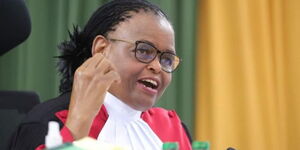Citizen TV political reporter Chemutai Goin, on Tuesday, stated that the joint decision by the Executive, Judiciary and Parliament to draft and submit policies to curb corruption may not achieve the intended results.
While analysing the agreement reached by President William Ruto and Chief Justice Martha Koome, Goin, who appeared on Hot96 FM, stated that the main issue in the anti-graft war is not the shortage of laws but the implementation of the existing ones.
In as much as laws help maintain order by resolving disputes and promoting fairness and justice, drafting more policies and guidelines may lead to saturation, according to the seasoned journalist.
“I have always said, in Kenya, we do not have a shortage of laws. We have sufficient laws. The goodwill of implementing those laws is what is lacking,” Chemutai Goin told the morning show hosts, Jeff Koinange and Nick Odhiambo.
“Remember whoever drafted that statement (on the joint meeting) is very cheeky. They say it was as an invitation from the Judiciary and (yet) it was a meeting of all the three arms of the government," she wondered.
According to the senior political journalist, a majority of the recommendations made at State House on Monday, January 22, were mainly centred on revitalising the Judiciary.
The agreement to draft the anti-graft policies also drew varied reactions from Kenyans ranging from politicians to activists alike.
Opposition leader Raila Odinga faulted the move by CJ Koome to meet President William Ruto to hold the meeting at the State House rather than a neutral venue.
“This is an irresponsible move, if there is supposed to be dialogue over issues of governance then it must be held in a neutral place,” Raila noted.
Several other Kenyans also questioned the need for drafting anti-graft policies despite the establishment of various government agencies such as the Ethics and Anti-Corruption Commission (EACC) which are obliged to deal with the same.
Others claimed the strategy to draft graft policies was bait by the Executive to bypass the roles of the Judiciary, clarifying each arm of the government should distinctly deal with corruption cases and therefore no need to draft new laws. Raila had issued similar remarks, accusing Ruto of attempting to hold the Judiciary hostage.
"Everything discussed in the meeting between CJ Koome and President Ruto is a preserve of Parliament and not the Executive," opposition politician and Rarieda MP Otiende Amollo stated during an interview on KTN News.
He argued that Ruto's decision to reward the Judiciary with 35 more judges and increased budget required an amendment to the law.
On Monday, January 22, the three arms of the government met and committed to enhancing service delivery, fighting corruption, and promoting the overall administration of justice to enhance the accountability of Kenyans.
The trio agreed to develop policies, guidelines, regulations, and legislative proposals to fight corruption, improve service delivery, and enhance institutional accountability of all arms of government.
To achieve these goals, the government agreed to come up with proposals that would be submitted to the National Council of the Administration of Justice (NCAJ) convened by Chief Justice Martha Koome within 30 days.












